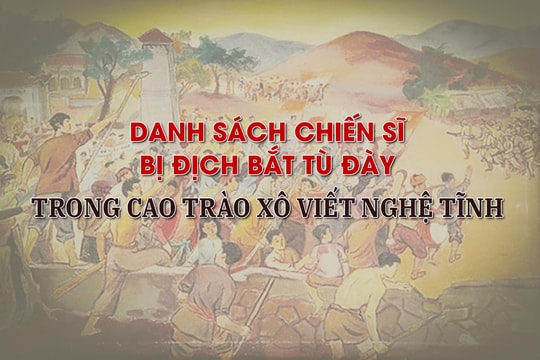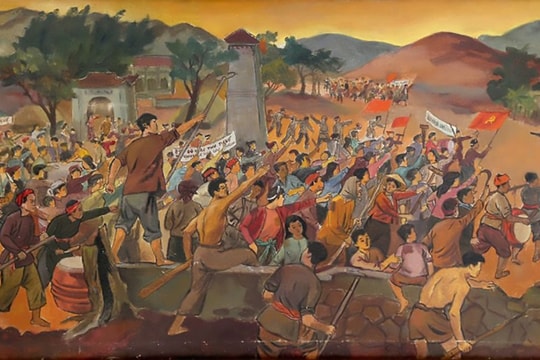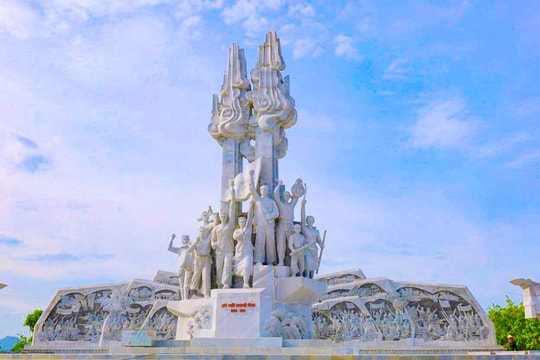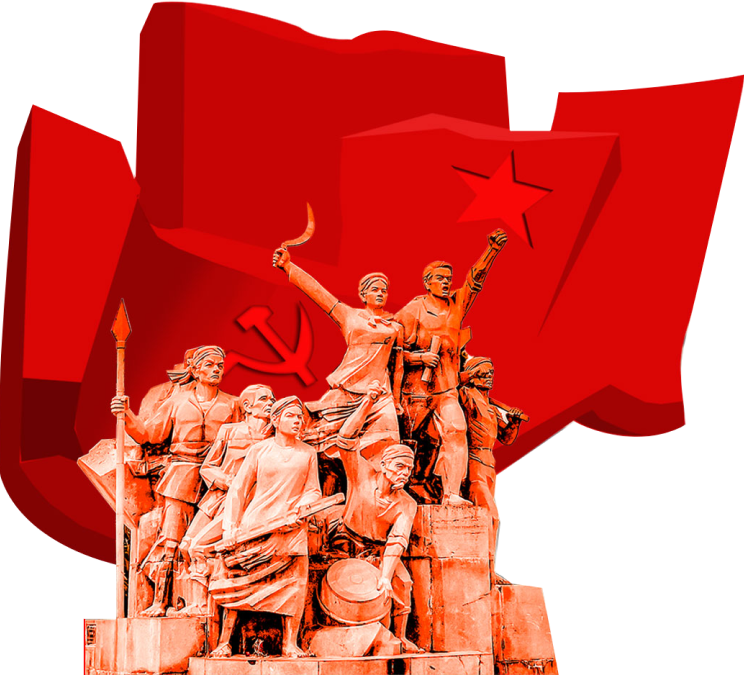Contributions of Comrade Tran Chau - Secretary of the Can Loc Provisional District Party Committee in the Nghe Tinh Soviet movement
Tran Quoc is a great family of Ich Hau land, with a tradition of studiousness, patriotism and great contributions to the cause of building and defending the country.
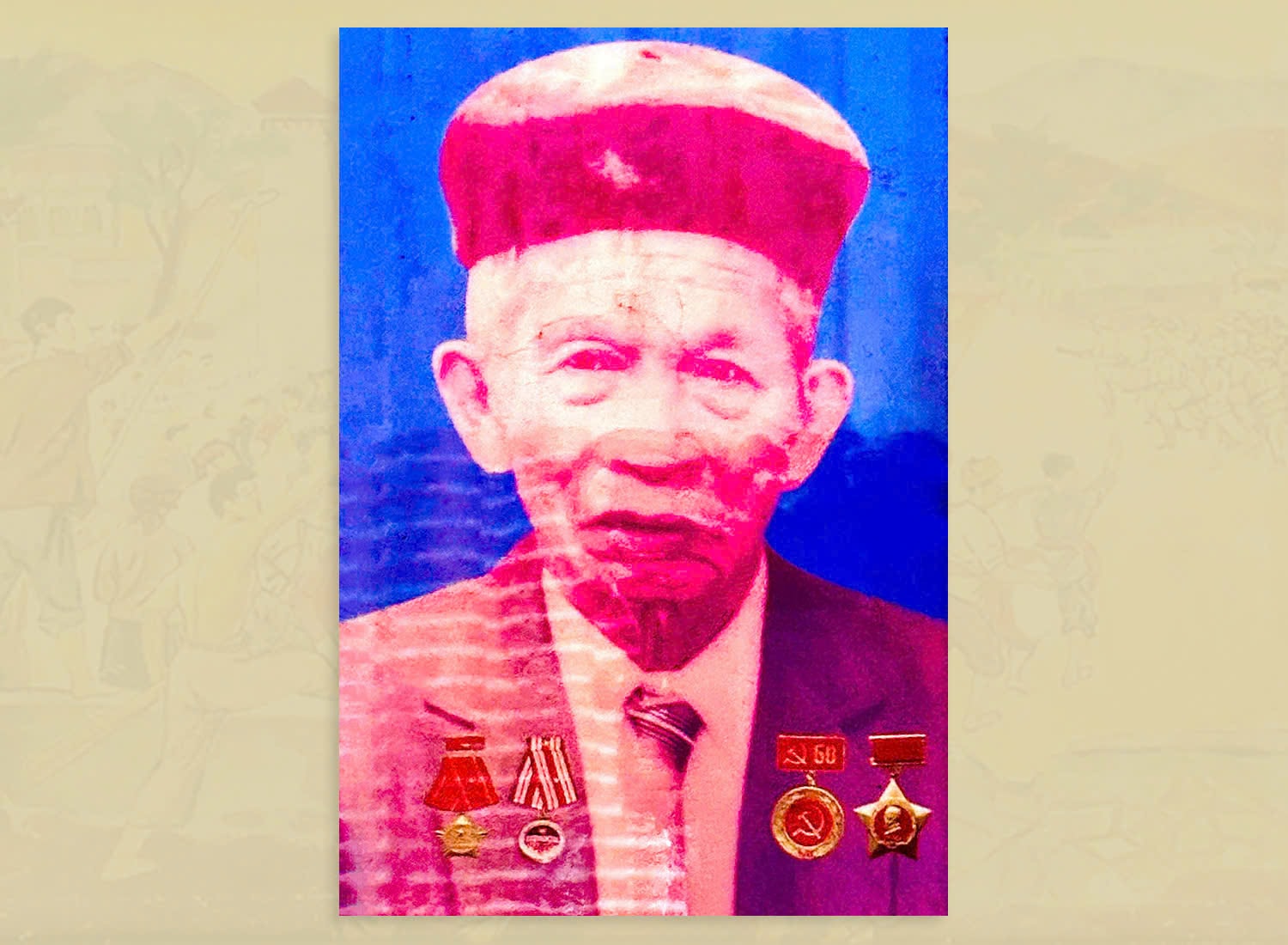
Comrade Tran Quoc Chau, also known as Tran Chau (1908 - 1993), (alias Kinh, Tho), was from Cai Luong village, Ba Xa village, Can Loc district (now Ich My hamlet, Ich Hau commune, Loc Ha district), Ha Tinh. His parents, Mr. Tran Quoc Quynh and Mrs. Nguyen Thi Chau, were gentle, simple farmers with a progressive patriotic spirit.
Born into the Tran Quoc family with a tradition of patriotism in his hometown of Loc Ha, and educated by his parents from an early age, comrade Tran Chau quickly absorbed progressive patriotic ideas and embarked on a path of revolutionary activities.
In 1927, comrade Hoang Khoai Lac (from Dinh Lu village, now Tan Loc commune, Loc Ha) came down to contact comrade Tran Chau and a number of patriotic youths in Ba Xa. The comrades established the Tan Viet Ba Xa sub-group to jointly propagate progressive patriotic ideas to all classes of people in Ba Xa.
In July 1929, realizing the development trend of the revolutionary movement, comrade Tran Chau and the Tan Viet Ba Xa sub-group agreed to dissolve the organization. In early 1930, comrade Tran Chau, Tran Ninh and Le Binh established the Indochinese Communist Reform Federation cell, with comrade Tran Chau as Secretary.
At the end of February 1930, the Central Region Party Committee sent comrade Tran Huu Thieu to Ha Tinh to contact comrade Tran Chau and the Indochinese Communist Federation branches, to announce the establishment of the Communist Party of Vietnam.
In March 1930, comrade Tran Huu Thieu, Tran Chau and comrades in Can Loc agreed to convert the Indochinese Communist Federation Can Loc branches into the Communist Party of Vietnam branches and established two new branches, Nguyet Ao and Phu Luu Thuong.
In April 1930, based on 7 Can Loc communist cells, comrade Tran Huu Thieu directed a conference to be convened at comrade Tran Doa's house in Yen Vinh village, Trao Nha commune. After discussing the direction of activities, the conference elected a provisional Can Loc District Party Committee Executive Committee consisting of 5 comrades. Comrade Tran Chau was elected by the conference to hold the position of Secretary.
Implementing the April 1930 Conference Resolution, Comrade Tran Chau directed the District Party Committee to carry out propaganda work, develop party members, build party cells and patriotic mass organizations in the localities. Comrade Tran Chau's house was one of the important meeting and printing facilities of the District Party Committee. From his house, instructions, leaflets, and documents serving the propaganda work and the people's struggle were printed and secretly transferred to the party cells.
At the end of July 1930, comrade Tran Chau convened a meeting to discuss plans to celebrate the International Day Against Imperialist War (August 1) to promote the influence of the Party and encourage the struggle movement. Comrade Tran Chau and the District Party Committee advocated directing the Party cells to carry out a demonstration at the district office to present demands for economic benefits.
Early in the morning of August 1, 1930, the District Party Committee and Party cells led the masses of Phu Luu and Lai Thach to gather at Ha Vang ferry, raised the Party flag, and marched to the district office. Faced with the power of the masses, District Chief Tran Manh Dan did not dare to send soldiers to suppress them, but instead used a delaying tactic to persuade the group to disperse. After the District Chief agreed to report his ten demands to the provincial authorities, the protest group was instructed to disperse and retreat.
This was the first demonstration of the people of Can Loc and also the first demonstration of the people of Ha Tinh marching to the district office to fight and win. The Ha Tinh Provincial Party Committee highly appreciated the significance of this demonstration: “…it opened the struggle movement of the farmers of Ha Tinh, demonstrating the extraordinary strength of the peasants, forcing the imperialists and feudalists to give up, the District Chief had to bow and accept the demands…”.
To continue to move forward the Can Loc people's struggle movement, in September 1930, comrade Tran Chau and the District Party Committee continued to advocate and lead the Party cells to protest on a district-wide scale, gathering at the district office to question the District Chief for his delay in responding to the demands of the protest on August 1, 1930.
On the morning of September 7, 1930, more than 1,000 farmers from the five communes of Phu Luu, Noi Ngoai, Doai, Nga Khe, and Lai Thach, under the direction of the District Party Committee and Party cell, carried hammer and sickle flags, chanted slogans, and marched from all directions to the district capital. When the protesters reached the district headquarters, the District Chief and the local officials were terrified and fled.
Taking advantage of the victory, under the direction of the District Party Committee and Party members, the masses stormed the district office, burned books and papers, and opened prisons to free the prisoners. The victorious struggle, which temporarily paralyzed the enemy government, contributed to affirming the role and contribution of comrade Tran Chau - Secretary of the Can Loc District Party Committee.
In March 1931, when the Can Loc revolutionary movement was developing strongly, comrade Tran Chau was trusted by the Provincial Party Committee to go to Nghi Xuan to help the district rebuild the revolutionary movement.
On April 27, 1931, an expanded District Party Committee meeting was held at Nha Ngai Temple (Xuan Vien) to assess the situation and plan to launch a district-wide struggle to celebrate International Labor Day, May 1, 1931.
On the morning of May 1, 1931, under the direction of comrade Tran Chau and Nghi Xuan District Party Committee, nearly 2,000 people beat drums and flags to advance to the district capital, shouting slogans of struggle. Frightened by the power of the masses, Nghi Xuan District Chief hastily went into hiding.
To maintain the mass struggle movement and at the same time strengthen the leadership role of the Party, on May 22, 1931, Nghi Xuan District Party Committee held an expanded conference to elect comrade Tran Chau and a number of other comrades to supplement the Executive Committee. Under the leadership of comrade Tran Chau and the District Party Committee, the entire district now had 9 Party cells with 71 Party members, and patriotic mass organizations were constantly consolidated and expanded.
Faced with the strong development of the Nghe Tinh revolutionary movement, the French colonialists and the puppet Southern Dynasty government used many policies to terrorize and suppress the people's struggle. From July 1931, the enemy conducted many searches and arrests, causing the Nghi Xuan District Party Committee in Xuan Vien, then Tien Bao to be exposed one after another. Comrade Tran Chau and many key comrades of the Nghi Xuan revolutionary movement fell into the enemy's hands one after another.
Because he was identified as the Secretary of the Can Loc District Party Committee, a key member of the Nghi Xuan revolutionary movement in particular and Ha Tinh in general, the enemy used many tricks of bribery and torture. Unable to shake the will of communist prisoner Tran Chau, on April 21, 1932, the enemy sentenced him to 5 years in prison and 2 years of house arrest (unclear sentence).
During the time he was imprisoned by the enemy, Tran Chau's house was still a base for hiding Party cadres. His mother, Nguyen Thi Chau, regardless of the dangers and the lurking of the secret police, served the superior cadres whenever they returned to the locality to hold meetings and direct the revolutionary movement.
After being released, comrade Tran Chau returned to his hometown and continued his revolutionary activities. He joined the Viet Minh front, together with the people of Ba Xa, raised the flag high, and successfully organized the struggle to seize power in August 1945.
From 1945 to 1948, comrade Tran Chau was an active cadre in the popular education work of Ngo Son commune.
In 1956-1957, comrade Tran Chau continued to be elected as Secretary of the Party Committee of Hau Loc commune.
After retiring, comrade Tran Chau moved to Gia Lai to live with his son.
As one of the first generation of party members of his hometown Can Loc in particular, Ha Tinh province in general, comrade Tran Chau - Secretary of the provisional Can Loc District Party Committee in 1930 made many contributions to the Nghe Tinh Soviet movement. Under the leadership of him and the District Party Committee, the people of Can Loc heroically rose up to fight against the French colonialists and the feudal puppet government, contributing to the brilliant milestone of the Vietnamese revolutionary movement in the years 1930-1931.
For his contributions to the revolutionary movement of his homeland, comrade Tran Chau was awarded the 60-year Party membership badge and the Second-class Independence Medal (1985). Mrs. Nguyen Thi Chau, his mother, was also awarded the Certificate of Merit to the country by Prime Minister Pham Van Dong (1967).
_____________________
References:
- History of Ha Tinh Party Committee, Volume I (1930-1954), National Political Publishing House, 1993;
- History of the Communist Party of Vietnam in Can Loc district 1930-2000, National Political Publishing House, 2005;
- History of Nghi Xuan District Party Committee (1930-1945).
- History of the Party Committee and People of Ich Hau Commune (1930-2005), Culture - Information Publishing House, 2008;
- French secret documents about comrade Tran Quoc Chau;
- Documents provided by comrade Tran Quoc Chau's family.

